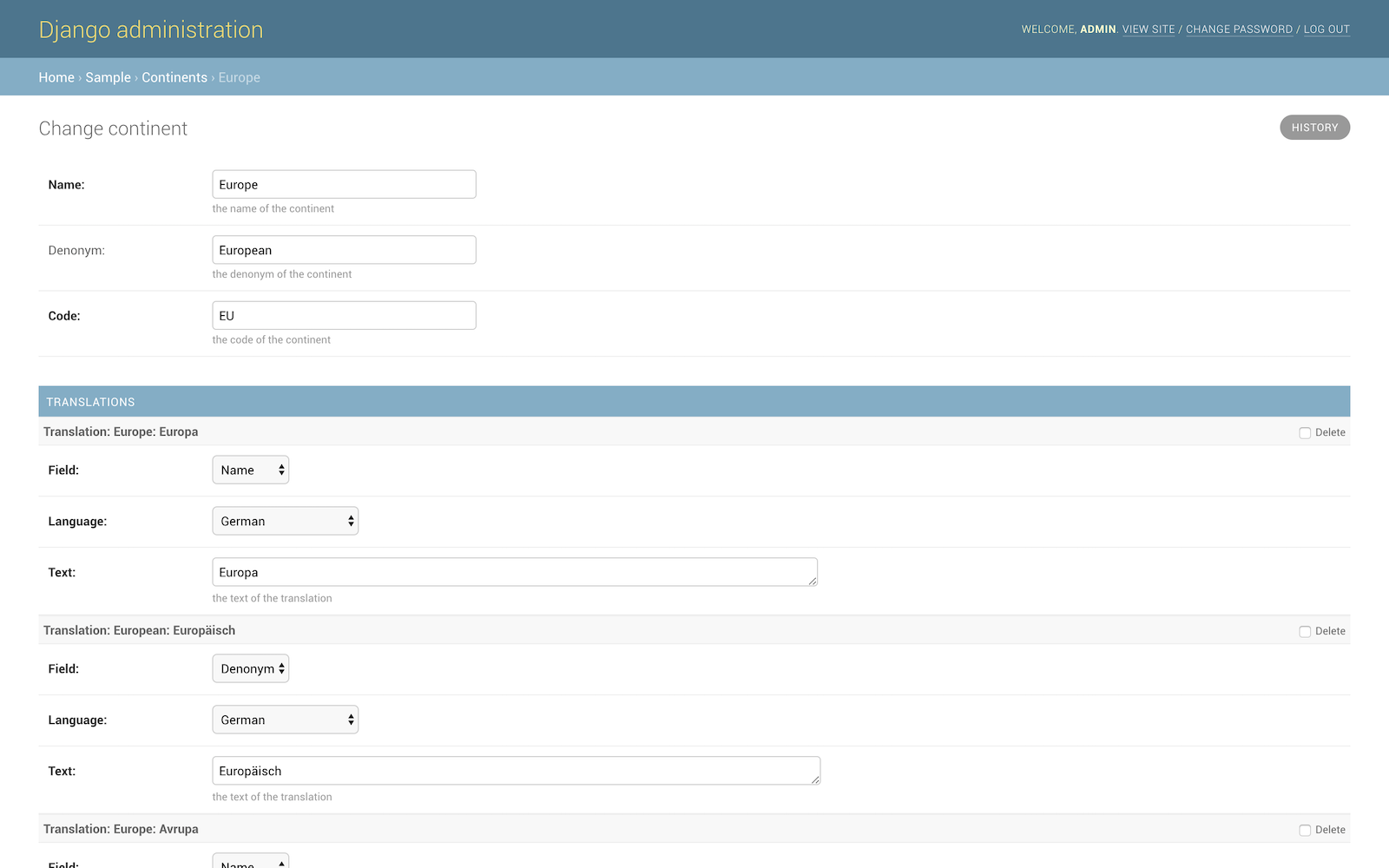An easy, efficient and modular way of translating django models.
Project description
Translations app provides an easy, efficient and modular way of translating Django models.
Requirements
Python (>=3.5)
Django (>=2.0)
Installation
Install Django Translations using pip:
$ pip install django-translationsAdd translations to the INSTALLED_APPS in the settings of your project:
INSTALLED_APPS += [ 'translations', ]Run migrate:
$ python manage.py migrateConfigure Django internationalization and localization settings:
USE_I18N = True # use internationalization USE_L10N = True # use localization MIDDLEWARE += [ # locale middleware 'django.middleware.locale.LocaleMiddleware', ] LANGUAGE_CODE = 'en-us' # default (fallback) language LANGUAGES = ( # supported languages ('en', 'English'), ('en-gb', 'English (Great Britain)'), ('de', 'German'), ('tr', 'Turkish'), )Please note that these settings are for Django itself.
Basic Usage
Model
Inherit Translatable in any model you want translated:
from translations.models import Translatable
class Continent(Translatable):
code = models.Charfield(...)
name = models.Charfield(...)
denonym = models.Charfield(...)
class TranslatableMeta:
fields = ['name', 'denonym']That’s it! NO MIGRATIONS needed afterwards.
Admin
Use the admin extensions:
from translations.admin import TranslatableAdmin, TranslationInline
class ContinentAdmin(TranslatableAdmin):
inlines = [TranslationInline,]This provides specialized translation inlines for the model.

QuerySet
Use the extended queryset capabilities:
>>> from sample.models import Continent
>>> continents = Continent.objects.all(
... ).distinct( # familiar distinct
... ).probe(['en', 'de'] # probe (filter, exclude, etc.) in English and German
... ).filter( # familiar filtering
... countries__cities__name__startswith='Köln'
... ).translate('de' # translate the results in German
... ).translate_related( # translate these relations as well
... 'countries', 'countries__cities',
... )
>>> print(continents)
<TranslatableQuerySet [
<Continent: Europa>,
]>
>>> print(continents[0].countries.all())
<TranslatableQuerySet [
<Country: Deutschland>,
]>
>>> print(continents[0].countries.all()[0].cities.all())
<TranslatableQuerySet [
<City: Köln>,
]>This does only ONE QUERY to translate the queryset and its relations.
Context
Use the translation context:
>>> from translations.context import Context
>>> from sample.models import Continent
>>> continents = Continent.objects.all()
>>> relations = ('countries', 'countries__cities',)
>>> with Context(continents, *relations) as context:
... context.read('de') # read the translations onto the context
... print(':') # use the objects like before
... print(continents)
... print(continents[0].countries.all())
... print(continents[0].countries.all()[0].cities.all())
...
... continents[0].countries.all()[0].name = 'Change the name'
... context.update('de') # update the translations from the context
...
... context.delete('de') # delete the translations of the context
...
... context.reset() # reset the translations of the context
... print(':') # use the objects like before
... print(continents)
... print(continents[0].countries.all())
... print(continents[0].countries.all()[0].cities.all())
:
<TranslatableQuerySet [
<Continent: Europa>,
<Continent: Asien>,
]>
<TranslatableQuerySet [
<Country: Deutschland>,
]>
<TranslatableQuerySet [
<City: Köln>,
]>
:
<TranslatableQuerySet [
<Continent: Europe>,
<Continent: Asia>,
]>
<TranslatableQuerySet [
<Country: Germany>,
]>
<TranslatableQuerySet [
<City: Cologne>,
]>This does only ONE QUERY to read the translations of any object (instance, queryset, list) and its relations, or to create their translations.
Documentation
For more interesting capabilities browse through the documentation.
Project details
Release history Release notifications | RSS feed
Download files
Download the file for your platform. If you're not sure which to choose, learn more about installing packages.
Source Distribution
Built Distribution
Hashes for django-translations-1.0.0rc8.tar.gz
| Algorithm | Hash digest | |
|---|---|---|
| SHA256 | 8bc0dbbd46bac594387b34746855d73a6796dc4437a08c6ff70e5fdc3e65157f |
|
| MD5 | 93b1470f0d6267b6a94e2e0cedb8bee0 |
|
| BLAKE2b-256 | 0b92560a8648d4201b1449137acf2d14493d0664b037ad0793f432e87b86890a |
Hashes for django_translations-1.0.0rc8-py3-none-any.whl
| Algorithm | Hash digest | |
|---|---|---|
| SHA256 | 4ae18f813bd4545d9e6b9422e63a402e9839d5037265f77419f4400311d140ae |
|
| MD5 | 962be1c98ce5601f8dbd60f39536b80e |
|
| BLAKE2b-256 | 805d667567df583cef4b4878d5eaf7a9d90845f0cf8e0ad4174e059187a6a140 |
















